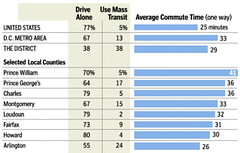While regional transit improvements matter, I don't cry for exurbanites
 Washington Post graphic. Census Bureau data.
Washington Post graphic. Census Bureau data.Today's Post front page story is about commuting "Daily Misery Has a Number: Commute 2nd-Longest in U.S." From the article:
But transit use is also rising in closer-in jurisdictions. Metrorail trips grew 17 percent from 2000 to 2005. The system has opened several stops since 2000.
But Dan Tangherlini, Metro's acting general manager, said: "We have seen large increases in the core stations as well. Some of our biggest-growing stations are places like Gallery Place, which has grown as a destination in and of itself."
Tangherlini said that when the system updates its survey of rail riders this year, "I've got some friendly bets here we will see large increases in out-of-compact origins" -- people who drive in from exurban counties that do not have Metro stations.
______
If you look at the data presented in the table (unfortunately excluding Alexandria), the "real story" could be that the two "counties" most compactly developed--DC and Arlington--have the shortest average commutes in the region.
And comparing commutes in the DC region to the "national" average seems a bit too overbroad to me. How about comparing it to the top 10 metropolitan regions instead?
Well-designed density increases transit use, as well as walking and bicycling, and reduces car usage. So yes, as more people live in the city, and closer to work, such as living and working downtown, transit use with DC-based origins could actually decline. (E.g., as big as an advocate for transit usage as I am I don't ride the subway all that much, unless I am going up to Brookland or out of the city, otherwise I bicycle to most places.)
Also see:
-- Transit competitiveness in polycentric metropolitan regions • Jeffrey M. Casello, from Transportation Research Part A, January 2007;
-- Developing Transit • Paul L. Marx, Effie Stallsmith and Maria V. Zimmerman, from Mass Transit Magazine
Index Keywords: transit; urban-design-placemaking



0 Comments:
Post a Comment
<< Home